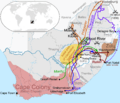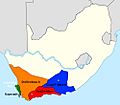Boer facts for kids
The word Boer (pronounced like "boor") is a Dutch word for "farmer." It's used to describe the descendants of Dutch farmers who settled in Southern Africa during the 1700s. It also refers to those who left the Cape Colony in the 1800s. They moved to areas like the Orange Free State and Transvaal. They did this to get away from British rule and wars with native tribes.
Early History of the Boers
In 1657, nine early farmers at the Cape were given special permission to farm. They were called "Boers" (or "Boere" in Dutch). Even though they weren't called Afrikaners yet, they didn't see themselves as living in a European country.
As more people from Europe arrived at the Cape, more marriages happened between different groups. Over time, their language and culture changed. They began to see themselves as a new nation, the Afrikaner people. For example, Paul Heyns, born in 1696, named his son Michiel Afrikanus. In 1707, a man named Hendrik Bieslow publicly declared, "I am an Afrikaander."
The Great Trek and Boer Republics
Later, the Boers created their own independent states called the Boer Republics. These republics were defeated in two major conflicts. These were the Anglo-Boer wars of 1880-1881 and 1899–1902.
After these wars, many Boers moved to other countries. However, many still live in modern South Africa, Eswatini, and Zimbabwe.
Images for kids
-
Map of the Cape Colony in 1809, during early British rule
-
Passing Cradock Pass, Outeniqua Mountains, by Charles Collier Michell
-
An aquatint by Samuel Daniell of Trekboers making camp
See also
 In Spanish: Trekboer para niños
In Spanish: Trekboer para niños
 | Sharif Bey |
 | Hale Woodruff |
 | Richmond Barthé |
 | Purvis Young |












